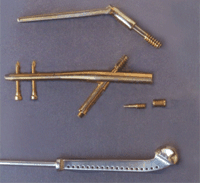Material Stainless Steel
It is a make-in-India initiative of IIT BHU. The institution, in collaboration with the PSU, Midhani, has developed a Nickel-free, high-Nitrogen stainless steel that can be used for making biomedical implants. The institution is ready to transfer the technology to the Indian industry.
The Indian orthopaedic industry suffers from want of proper raw materials for implants. A stainless steel variety called 316L has been found to be biocompatible and load-resistant. A good choice, but it suffers from one drawback—it keep releasing Iron, Chromium and Nickel ions. Of these, Nickel ions are toxic. They cause swelling, erythema, discomfort and skin changes in the area of implant. Further, accumulated Nickel in the body could lead to lung fibrosis, cardiovascular and renal failures.
To solve this problem, IIT BHU decided to develop a new material. In collaboration with Midhani, it replaced Nickel with Manganese and Nitrogen, both of which (like Nickel) give SS a good austenitic property (which means non-magnetic and high formability.) This new alloy has excellent mechanical properties and is corrosion resistant. Nitrogen in the steels improves the tensile strength and yield strength, and decreases the ductility.
IIT BHU had planned to hold a conclave on Nickel-free Stainless Steel for Biomedical application May 15, 2020, but this may not happen because of the coronavirus outbreak.
Also read: Ultra-light, super-strong, magnesium alloy for automobiles, aerospace



